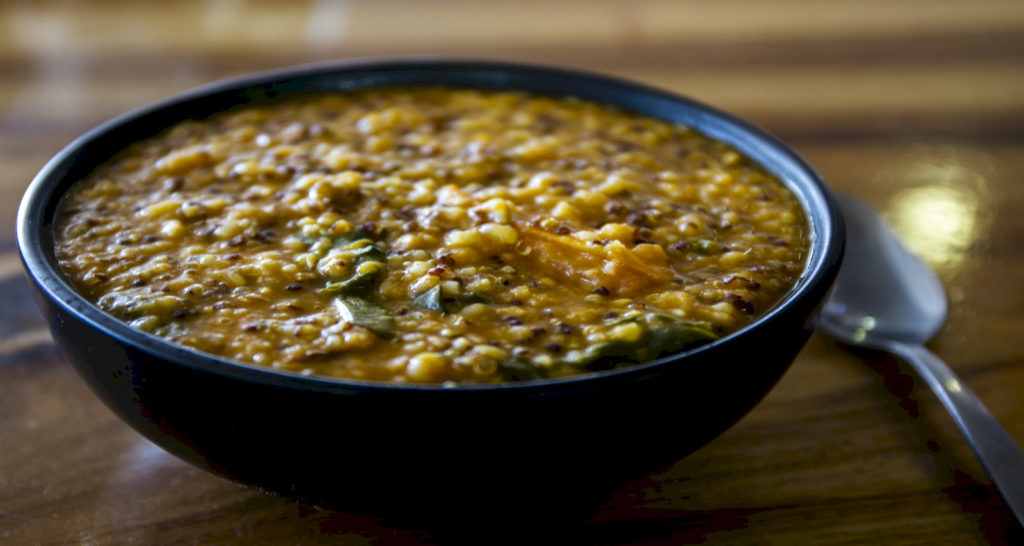If you’re ANYTHING like me, you might find yourself overwhelmed, overburdened, and overstimulated during the holiday season. With COVID in full swing, the only bright note is that there are at least fewer parties, commitments, and therefore, fewer inflammatory treats and tight dresses that require a bra!
Even so, with the launch of The Focus Factor, wrapping up filming, putting the polishing finishes on a book, and squeezing in a mini-program, I have certainly found myself, well, exhausted.
But that exhaustion is no excuse for not nourishing my brain and body. Which is why I wanted to share with you a delicious, easy, and seasonally appropriate recipe that is my go-to weeknight meal, especially when I’m feeling exhausted and overwhelmed: Kitchari!
If you’re not familiar with this wonderful dish, it’s a traditional stew-like Ayurvedic dish that in Hindi means “mixture.” It is not only tremendously helpful with digestion owing to the fact that it is loaded with fiber from lentils, root vegetables, and leafy greens, but the warming spices and ghee give you something to cozy up to on a chilly December evening — without having to resort to take-out!
My favorite part of it? It’s a fabulous way to clean out the kitchen!
Because you cook everything down, you can get away with using celery or broccoli that’s lost their spunk, without having to toss them!
This is also a great way to sneak in a mindfulness practice by exploring how luxurious it can be to chop up vegetables.
This comforting recipe is the perfect autumn or winter dish to have as a quick weeknight meal, or to serve for a large group. It is incredibly nourishing, easily digested, can be made hearty and thick or light and soupy, and is a great way to use the vegetables that need to get used!
The recipe is below. I hope that you use it to nourish your brain and body in this topsy-turvy time!
Clean out Your Kitchen Kitchari
One pot typically serves 6-8.

Ingredients 1 cup yellow mung dal 1/2 cup white basmati rice or quinoa 1 cup rinsed and pre-cooked garbanzo beans 2 tbs ghee, or clarified butter 2 bay leaves 2 tsp black pepper 1tsp sea salt 1 tsp ground coriander 2 tsp cumin 2 tsp fennel 3 tsp turmeric 2-3 tsp ground ginger (depending on how warming you want it to be) pinch of cardamom pinch of cloves chopped handful of parsley 5-7 cups of water (depending on how thick/soup-like to desire) 5-7 cups vegetables (spinach, celery, kale, beet greens, zucchini, beans, broccoli, fennel bulb, cauliflower, sweet potato are all great options) Directions Rinse Dal & rice checking for any pebbles or debris. Chop all vegetables to your liking, If you want the kitchari to be a bit more soupy, you might choose to cut them smaller to allow them to emulsify a bit. I like my kitchari a bit more on the hearty side, so I leave the vegetables larger. It also allows for more chewing, for an optimized digestion experience, and a more mindful eating experience. Set aside. Measure and place all spices into a small bowl, allowing them to be added all at once. Warm pot and add ghee on medium, when melted, add in all spices, stirring for about a minute, being careful not to overheat/burn, resulting in a bitterness. When you feel your spices are toasted to your liking, add into the pot your dal and rice with water, add vegetables, reserve parsley. Stir and let come to a boil. Reduce to a simmer, cover, and let cook for ~40 minutes, or until rice and dal have softened completely. Stir in parsley, serve, and enjoy for breakfast, lunch or dinner.
